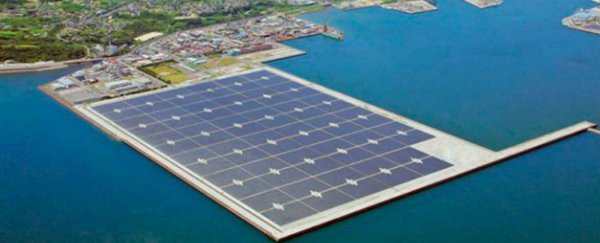Two massive floating solar power plants have just been completed in Japan, ready to power 1,000 homes without taking any electricity from the grid.
The 'mega-plant' is just one of a number of moves the country is making to increase its reliance on sustainable energy sources since the 2011 Fukushima nuclear disaster. Over the past few years, Japan has managed to double its solar power capacity, and if plants like these are as efficient as they're expected to be, there's no reason why it can't continue to tip the balance in favour of renewable energy sources.
The plants are located on the Nishihira and Higashihira Ponds in Kato City, which is part of the Hyōgo Prefecture of Japan. Built by energy company, Kyocera Corporation, and the Century Tokyo Leasing Corporation, the plants were installed in just seven months, and according to Liat Clark at Wired UK, together their 11,250 modules are expected to generate 3,300 megawatt hours (MWh) every year.
And while floating sounds a little more difficult than building a solar array on the nice, hard ground, there are actually many benefits to suspending all your solar panels on the surface of a lake. Firstly, in a country like Japan, where land space is scarce, taking up water space is the perfect solution. The plant is also typhoon-proof, and because it uses the water below to cool itself, is actually more energy-efficient than if it was built on the land.
"Reservoirs are also an ideal location because the panels produce shade, which reduces water evaporation and promotes algae growth. A report by Korea Water Resources Corporation found that the lower temperatures of the floating modules mean they are 11 percent more efficient than land-based equivalents. The report identified unsolved issues with the plants, too, however. It said the study had to discard data collected when the panels moved in the wind, and said research into new mooring systems was 'continually needed'."
Challenges aside, hopefully these plants live up to their potential. It would be great to see Australia - a land of abundant sunshine - to take a similar approach.
Source: Wired UK
